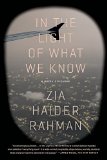Summary | Excerpt | Reviews | Beyond the Book | Readalikes | Genres & Themes | Author Bio

The seat of our faith in the endurance of our life together, it is plainly visible to me now, was the store we set in the similarity of our cultural backgrounds. My wife and I were both the children of Pakistanis, immigrants, Muslims, and we had faith that our union was of things greater than ourselves, that it would survive, even flourish, because of a history of generations that intertwined in us. We could never imagine that the strength of our faith might merely have been conjured from longing.
Weeks of such rumination had fed a growing fear of what the future held, when Zafar's reappearance came as a relief and diversion, though later it would come to mean much more than that. Seeing him again restored in me a sense of continuity with something older than my marriage, older than my work—a period of limitless possibility. There was the revival of things forgotten over years of pounding the professional treadmill while watching life ebb away from the home. Seeing him was enough to set off in me an electrical firestorm of associations that had lain dormant for years, and I felt a renewed sense of the timeless beauty I had known during my studies. Mathematics, as Zafar had said many moons ago in New York, cannot contain its own beauty.
It had seemed extraordinary to me in those days that my brilliant friend had ever chosen to give up a career in mathematics to study law, and when I once asked him why he had switched gears so sharply, he replied merely that it could be an interesting thing to do. Kurt Gödel had edged toward madness over the course of his life, near the end relying on his forbearing wife to taste his food first, for fear that it might be poisoned, so that when she herself was taken gravely ill and was unable to perform this function, Gödel starved to death. I think that Zafar had some premonition of the madness that might await him in mathematics, though this danger, I see now, never actually left his side. This, then, is how I understand him now: a human being fleeing ghosts while chasing shadows. This also accounts for the twists and turns in his working life, changes of direction that I came to observe largely from afar, as in time our friendship lost its moorings, in the way perhaps of many college friendships.
Through a web of friends and acquaintances, I maintained some notion of Zafar's path, but even before he disappeared there seemed curiously little known about him. Sometime in 2001, Zafar vanished from sight altogether, thereafter to become, from time to time, the subject of rumors, some apparently preposterous, that he had converted to Roman Catholicism and married an English aristocrat, that he had been spotted in Damascus, Tunis, or Islamabad, and that he had killed a man, fathered a child, and, absurdly it seemed, spied for British intelligence.
* * *
That day in 2008, when Zafar resurfaced on my doorstep, he stood there, for one hovering moment of stillness, waiting to be let in, and I perceived the spark of recognition in his eye. The house had not changed much since he had last set foot in it nearly a decade before. He asked me if I had fixed the leg of the ottoman in the study. I laughed. One corner of the ottoman was still propped up by books.
Do you have the leg?
It's still there under the desk, I replied.
I'll mend it—but not today. I have to sleep.
An hour after I left him in the guest room, I went back to collect his clothes and found a small pile beside the duffel bag. Zafar was murmuring in his sleep. For a minute, I tried to decipher his words but I couldn't.
I took his laundry to the cleaners, where I noted the sizes of his pants and shirt (I wish now that I had checked the pockets but I didn't). Then, before heading to the office to put in a few perfunctory hours, I stopped off at the Gap intending to buy some new clothes for him, like the ones he was wearing, cargo pants and flannel shirts. I'd got as far as the checkout before realizing I'd absentmindedly picked up a pair of khaki trousers and a blue cotton shirt. A banker's taste in clothes is about the only thing predictable in banking.
Excerpted from In the Light of What We Know by Zia Haider Rahman. Copyright © 2014 by Zia Haider Rahman. Excerpted by permission of Farrar, Straus & Giroux. All rights reserved. No part of this excerpt may be reproduced or reprinted without permission in writing from the publisher.
Courage - a perfect sensibility of the measure of danger, and a mental willingness to endure it.
Click Here to find out who said this, as well as discovering other famous literary quotes!
Your guide toexceptional books
BookBrowse seeks out and recommends the best in contemporary fiction and nonfiction—books that not only engage and entertain but also deepen our understanding of ourselves and the world around us.